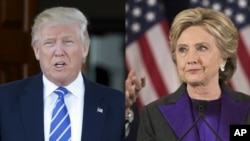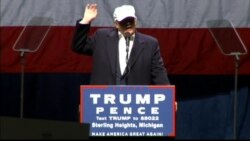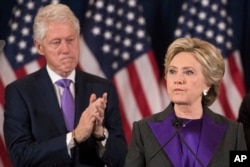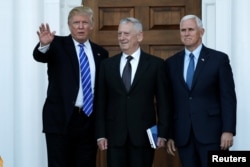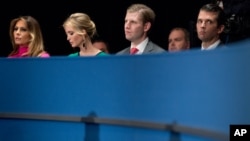U.S. President-elect Donald Trump appears to be backing away from some of his firmly held campaign themes, including putting Democratic presidential rival Hillary Clinton in jail.
Trump met Tuesday with reporters and editors from The New York Times, the venerable newspaper he condemned during the campaign as dishonest and a "failing" publication, but now says he respects and reads.
Trump strongly said that he has no intention to call for a further investigation into Clinton's use of a private email server when she was secretary of state and into questions surrounding the charitable Clinton Foundation.
"I don't want to hurt the Clintons. I really don't. She went through a lot and suffered greatly in many different ways... the campaign was vicious," he said.
Trump said investigating Clinton is not something he feels "very strongly about."
'Very divisive'
"I think it would be very, very divisive for the country," Trump told reporters and editors at The New York Times. "My inclination would be for whatever power I have on the matter is to say let's go forward. This has been looked at for so long, ad nauseam."
WATCH: Trump on Clinton email debacle during campaign speech
Trump constantly referred to Clinton as "Crooked Hillary" during the campaign. He stood by contentedly at rallies and listened to crowds shout "lock her up." He had promised to have a special prosecutor to look into her case and even directly threatened her with jail during one of the presidential debates.
The FBI has completed its investigation into the Clinton email case but its inquiry into the Clinton Foundation remains open. According to the 2015 book "Clinton Cash," written by Peter Schweizer, foreign entities donated money to the foundation in exchange of favors from the State Department, which was under Clinton's watch. The Clintons have maintained they did nothing wrong.
If Trump ordered the FBI to close the foundation inquiry when he becomes president, the agency's director, James Comey, could refuse. FBI directors are given ten year terms to shield themselves from political coercion.
Trump's decision not to push for investigations into Clinton's email use or the Clinton Foundation may not deter some Republican Party members on Capitol Hill. Republican Congressman James Chaffetz, who chairs the powerful House Oversight and Government Reform Committee, has promised to continue to investigate Clinton's use of emails.
By backing off his promises to investigate Clinton, Trump's has outraged some of his most passionate supporters. Breitbart News, a conservative news organization that has strongly supported Trump, published the headline Tuesday "Broken Promise."
Climate Change
Trump, who once called global warming a Chinese-created hoax, also appears to be backing down from his threat to withdraw from the Paris Climate Change Agreement.
Trump told the Times that "clean air is vitally important" and believes "there is some connectivity between" climate change and human activity.
"I'm looking at it very closely. I have an open mind" about the accord, he said.
The billionaire real estate mogul also appeared to have changed his mind about torturing terrorism suspects. Trump suggested he changed his mind after meeting with retired Marine Corps General James Mattis, a leading candidate for secretary of defense.
Trump said General Mattis never thought harsh interrogation techniques "to be useful," and added that the general preferred developing trust with "a pack of cigarettes and a couple of beers."
When asked for his reaction to a group of white nationalists caught on camera, throwing Nazi salutes and shouting "Hail Trump" during a conference on Saturday in Washington, D.C, the president-elect said, "I disavow and condemn them."
"It's not a group I want to energize," he said. But he defended his appointment of alt-right leader Steve Bannon as his chief counselor. Bannon has been accused of racism, sexism and anti-Semitism chiefly through his time as head of the ultra-right website Brietbart News.
"If I thought he was a racist... I wouldn't think about hiring him," Trump said.
Conflicts of interest
The incoming president has been facing questions of whether he can run his multibillion-dollar real estate and corporate empire and be president at the same time. He told the newspaper that in theory, "I could run my business perfectly and then run the country perfectly."
He said even though the law is on his side, a president cannot have any conflicts of interest and that he is in the process of turning over his businesses to his children.
Backing down from some of his most vigorous campaign promises may disappoint many Trump supporters who want to see Clinton in prison and the U.S. shred its obligations to cut carbon emissions.
But Trump has promised to be a unifying leader and president for all.
President Barack Obama has said his successor will find there is a big difference between campaign rhetoric and the reality of the Oval Office.
Trump assumes power January 20 as Obama leaves office.




